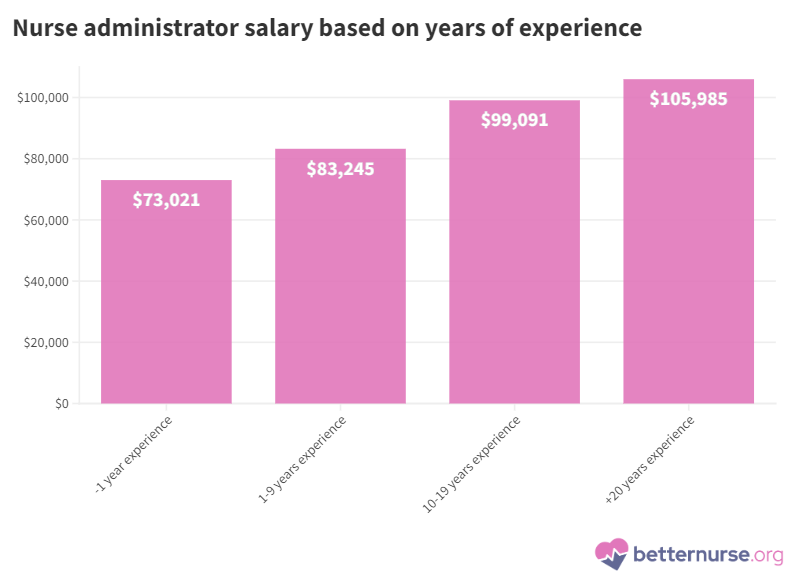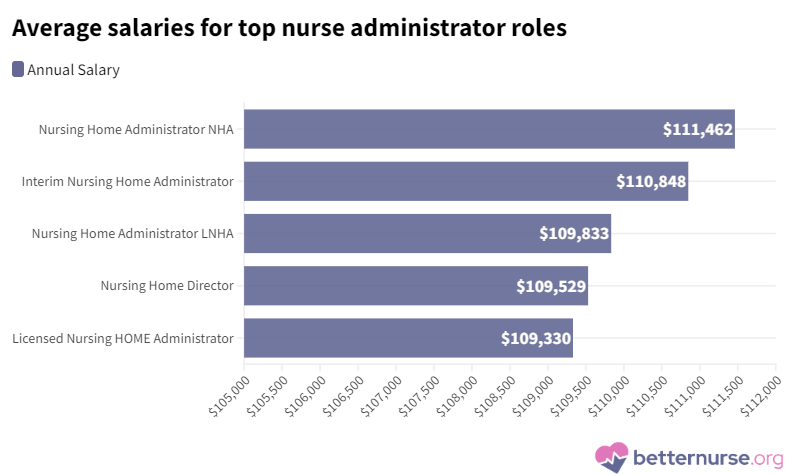Nursing is a highly respected and important profession in the healthcare industry, and there are many different paths that a nurse can take. One such path is nursing administration, which involves managing and leading teams of nurses in various healthcare settings.
As with any leadership role, nurse administrators are compensated for their expertise and responsibilities, and in this blog, we’ll be exploring the salary of a nurse administrator. Whether you’re a nurse considering a career in administration or an experienced nurse administrator looking to boost your salary, this blog will provide you with valuable insights into the earning potential of a nurse administrator.
Table of contents
What Is the Role of a Nurse Administrator?
A nurse administrator is responsible for managing and overseeing the operations of a healthcare facility or department, ensuring that patient care is delivered efficiently and effectively. Some of the main responsibilities of a nurse administrator include the following:
- Leading and managing a team of nurses and other healthcare staff
- Developing and implementing policies and procedures to ensure quality patient care
- Managing budgets and resources to ensure cost-effective operations
- Overseeing the hiring, training, and evaluation of staff
- Collaborating with other healthcare professionals to ensure coordinated care for patients
- Ensuring compliance with regulatory requirements and accreditation standards
- Analyzing data and monitoring performance to identify areas for improvement
- Participating in strategic planning and decision-making for the healthcare organization.
Nurse Administrator Salary & Job Outlook
According to the Bureau of Labor Statistics, the compensation for medical and health service managers, including nurse administrators, is $101,340 annually. This salary can vary significantly by state and is influenced by education, experience, and job responsibilities.
In addition to competitive wages, the job outlook for medical and health services managers, including nurse administrators, is optimistic. The demand for these professionals is expected to grow 28% over the following decade, much quicker than the average for all occupations.
Nurse administrator salary by state
The salary of a nurse administrator can differ significantly depending on the state where they work. The annual salary can range from $60,759 in the lowest-paying state (North Carolina) to $96,373 in the highest-paying state (New York). See the map for more details.
Nurse administrator salary based on years of experience
Entry-level nurse administrators with less than one year of experience are expected to earn an average total compensation (including tips, bonuses, and overtime pay) of $73,021. An early and mid-career nurse administrator with 1-9 years of experience earns an average compensation of $83,245.
On the other hand, a more experienced nurse administrator with 10-19 years of experience earns an average total compensation of $99,091, and in their late career (20 years or more), they make an average salary of $105,985.

Average salaries for top nurse administrator roles
Nurse administrators can have different responsibilities in different settings, impacting the average salaries for these roles. Some of the top nurse administrator positions include the following:

How To Increase Your Salary as a Nurse Administrator
As a nurse administrator, there are several strategies you can use to increase your salary over time. One of the most important factors in earning a higher wage is gaining experience and expanding your skills. You can do this by seeking further training, such as an advanced degree in nursing, healthcare administration, or business administration. You can also pursue specialized certifications in nursing informatics or healthcare quality management.
Another way to increase your salary as a nurse administrator is to take on additional responsibilities, such as overseeing multiple nursing units or departments, managing larger budgets, or taking on leadership roles in professional organizations. Building a strong network of professional contacts and staying current with industry trends can also help you advance your career and negotiate a higher salary.
Finally, it’s essential to research salary ranges in your geographic area and negotiate your salary during the hiring process or performance reviews. By using these strategies, you can increase your earning potential as a nurse administrator and advance your career in this vital leadership role.
Should You Become a Nurse Administrator?
Making the decision to pursue a career as a nurse administrator requires thoughtful reflection and consideration of your personal career aspirations and interests. If you enjoy nursing but are also drawn to leadership and management, becoming a nurse administrator may be an excellent fit for you.
This career path offers opportunities to impact patient care on a larger scale and to help shape healthcare policy and delivery. So, the nurse administrator career can be lucrative and fulfilling for those passionate about nursing, leadership, and healthcare management.
Benefits of being a nurse administrator
Becoming a nurse administrator offers numerous benefits, including:
- The ability to shape healthcare policy and delivery, making a positive impact on patient care and outcomes
- The opportunity to work with interdisciplinary teams and build strong professional networks, enhancing career opportunities
- High job security, as demand for healthcare administrators, is projected to grow much faster than average
- Competitive salaries that can increase with experience and additional education
- The opportunity to work in various healthcare settings, including hospitals, clinics, and long-term care facilities
- High levels of job satisfaction from leading and managing teams of nurse professionals dedicated to improving patient care
What’s the Bottom Line?
A nurse administrator is a crucial leadership role within the healthcare industry that requires a combination of advanced education and experience. They are typically compensated with higher salaries compared to registered nurses, and their salaries can vary depending on the state they live in and their job responsibilities.
Pursuing a career as a nurse administrator can be a rewarding path for those with a passion for nursing and healthcare management. If you’re considering a career in nursing leadership, it’s important to research the requirements and salaries in your area, as well as job opportunities and trends.
With the proper education, skills, and experience, you can seek a fulfilling and financially rewarding career as a nurse administrator.
We hope this guide has been a valuable resource for you in exploring the possibilities of a career in nursing administration. If you want to learn more about different career options in healthcare and the salaries they offer, you can click here and discover different pathways you can take as a nurse as well as find a high-paying nursing career that best suits you.
FAQs
- What is the highest-paid nursing job?
Nursing is a diverse field with many specializations, and salaries can vary significantly depending on the area of expertise. The highest-paid nursing professionals are currently certified registered nurse anesthetists (CRNA), with an average annual salary of $202,470.
- What is the difference between a nurse manager and a nurse administrator?
A nurse manager typically oversees a specific unit or department within a healthcare facility, while a nurse administrator is responsible for managing the overall operations of a healthcare facility or organization. Nurse administrators focus on healthcare policy, protocol, and nursing. On the other hand, nurse managers focus on direct patient care, organization, and assignments during their shifts.
- What are the principles of nursing administration?
The American Nurses Association (ANA) emphasizes these basic principles as a baseline for ethical nursing practice:
- Consensus across four Advanced Practice Registered Nurse (APRN) roles
- Role competence
- Substantiated supervision
- Accountability
- Patient-centered, team-based, collaborative care
- Evidence-based policy

Nurse Luke is a CRNA who specializes in Nursing content and still enjoys a very busy career with Locum, Per Diem and Travel nursing in the greater midwest. He has over 25 years of experience in the healthcare field and received his CRNA masters degree from the Mayo Clinic School of Healthcare. He is passionate about helping nurses explore the options of becoming a travel nurse as well as spending time with his Family.



